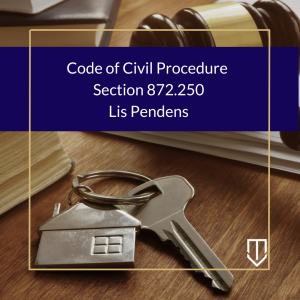 The Marketable Record Title act provides a statutory time limit to eliminate certain liens. Specifically, the purpose is to enhance the marketability of property by fixing an expiration date for certain interests, which are generally ancient mortgages, deeds of trust, unexercised options, powers of termination, unperformed contracts for the sale of real property, dormant mineral intersts, and abandoned easements, while also providing a procedure for allowing the interests to be preserved. In other words, the Act helps to simplify and facilitate real property transactions. In this blog, we’ll delve into what the Marketable Record Title Act entails, its significance, and how it impacts property owners.
The Marketable Record Title act provides a statutory time limit to eliminate certain liens. Specifically, the purpose is to enhance the marketability of property by fixing an expiration date for certain interests, which are generally ancient mortgages, deeds of trust, unexercised options, powers of termination, unperformed contracts for the sale of real property, dormant mineral intersts, and abandoned easements, while also providing a procedure for allowing the interests to be preserved. In other words, the Act helps to simplify and facilitate real property transactions. In this blog, we’ll delve into what the Marketable Record Title Act entails, its significance, and how it impacts property owners.
What is the Marketable Record Title Act (MRTA)?
The Marketable Record Title Act is a piece of legislation adopted by many states in the United States with the aim of clarifying and simplifying real property titles. Its primary objective is to extinguish certain old and dormant interests in real estate, thereby providing buyers with a more secure and marketable title. (see Robin v. Crowell (2020) 55 Cal.App.5th 727.)
 California Partition Law Blog
California Partition Law Blog


 Owning property can be complicated. The purpose of this blog post is to talk about different ways to hold title, and provides information on the meaning of some common terms so the average person can better understand their rights and responsibilities with respect to their property. Different types of property ownership come with different rights. By better understanding these terms, we hope to empower people to able to make the best possible decisions when faced with difficult situations.
Owning property can be complicated. The purpose of this blog post is to talk about different ways to hold title, and provides information on the meaning of some common terms so the average person can better understand their rights and responsibilities with respect to their property. Different types of property ownership come with different rights. By better understanding these terms, we hope to empower people to able to make the best possible decisions when faced with difficult situations. Before undertaking litigation over real estate in California, title insurance can help to provide clarity as to important ownership questions. Title insurance is not just nice to have, in many instances, the law specifically envisions that the parties will obtain a title report of some type. For example,
Before undertaking litigation over real estate in California, title insurance can help to provide clarity as to important ownership questions. Title insurance is not just nice to have, in many instances, the law specifically envisions that the parties will obtain a title report of some type. For example,  In California, an unrecorded interest is valid between the parties thereto and those who have notice thereof. (Civ. Code § 1217.)
In California, an unrecorded interest is valid between the parties thereto and those who have notice thereof. (Civ. Code § 1217.) In recent years, the growth of vacation rentals have driven the rise of purchasing investment properties in highly desirable areas throughout the country. For years, investment rentals were so profitable that many people jumped into the market and purchased properties to get a piece of the action. Unfortunately, in recent years, the sheer number of vacation rentals in these areas diluted the marketplace and made it increasingly more difficult to turn a profit from these investments, and in some cases, have lead to investment losses.
In recent years, the growth of vacation rentals have driven the rise of purchasing investment properties in highly desirable areas throughout the country. For years, investment rentals were so profitable that many people jumped into the market and purchased properties to get a piece of the action. Unfortunately, in recent years, the sheer number of vacation rentals in these areas diluted the marketplace and made it increasingly more difficult to turn a profit from these investments, and in some cases, have lead to investment losses. Generally, an owner can never legally “abandon” title to property. (Gerhard v. Stephens (1968) 442 P.2d 692, 713.) Instead, abandonment can only be found in situations dealing with personal property. Yet when the property interests in real property are in the nature of incorporeal hereditaments, the California Supreme Court has found that those interests can be abandoned.
Generally, an owner can never legally “abandon” title to property. (Gerhard v. Stephens (1968) 442 P.2d 692, 713.) Instead, abandonment can only be found in situations dealing with personal property. Yet when the property interests in real property are in the nature of incorporeal hereditaments, the California Supreme Court has found that those interests can be abandoned. What is an Ouster (Civ. Code § 843)?
What is an Ouster (Civ. Code § 843)? The California Partition Law begins at Code of Civil Procedure section 872.010 and ends at Code of Civil Procedure section 874.323. Section 872.250 outlines the procedure for a plaintiff seeking a partition of real property to record a lis pendens with the county office.
The California Partition Law begins at Code of Civil Procedure section 872.010 and ends at Code of Civil Procedure section 874.323. Section 872.250 outlines the procedure for a plaintiff seeking a partition of real property to record a lis pendens with the county office.  If you’re venturing into a real estate transaction and are daunted by the contracts, you’re certainly not alone. The jargon and intricate legal parlance can often make these contracts seem more complex than they actually are. Yet, the good news is that, armed with some guidance and understanding, these contracts become much less intimidating. Our friends at
If you’re venturing into a real estate transaction and are daunted by the contracts, you’re certainly not alone. The jargon and intricate legal parlance can often make these contracts seem more complex than they actually are. Yet, the good news is that, armed with some guidance and understanding, these contracts become much less intimidating. Our friends at